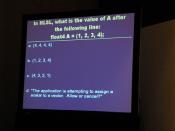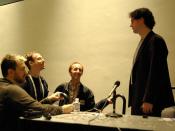GETTING A JOB AS A VIDEO GAME PROGRAMMER A video game programmer is the engineer for a game project. He/She designs and construct the software framework that allows a game to exist, including, the internal "systems" that bring life to all the game's artwork, characters, levels, and design ideas. Programmers also develop the tools that the rest of the team use to create content specific to the game, such as, level editors, plug-ins for commercial 3D graphics packages, or scripting engines (Wake).
Programming is the task of preparing a detailed set of instructions that a computer processor will follow, explaining how, when, and where to use the data in its memory (Fox 10). Usually, game programmers do not work directly with the processor's native instruction set, also known as assembly language. Instead, they write their code in a higher-level, more decipherable language such as C++, which is then translated by a compiler program to assembly language (Beck).
For most projects, the programming tasks can be separated in accordance with the different sub-systems that can make up a game. One set of programmers might be responsible for the game's AI, graphics engine, interface, or another for the tools used by the rest of the team. Programmers often specialize in one area, but all are driven by the need to write codes that are fast, efficient, reliable, flashy, and reusable (Beck).
Evans-2 Game programmers, by nature, tend to be highly intelligent, analytical, and obsessive people who love to solve problems. Usually, they have an interest in programming in all its forms, as well as math, physics, and other scientific-minded subjects, but are fascinated with games in particular (Hill). Programmers obsess over making coding faster, flashier, and tighter, and love to get computers to do peculiar things (Fox 11).
Although a lot of programmers in the past used to also double as game designers and artists, programmers now tend to be more specialized. Many are happy to let someone else come up with the game's conceptual design, and to stay focused on the technical challenges. Since nothing gets into a game without someone coding it, programmers do exert a certain influence over the grand design (Getsi).
Up until 1995 or so, a college degree was irrelevant in the game industry. Coding games was a very specialized craft that relied on the programmer's intimate knowledge of the hardware and repertoire of clever coding tricks (Getsi). The problem was not so much of designing elaborate software, but of beating the limitations imposed by the system. The necessary skills were learned through practice, not taught in any classroom. Programmers tended to work alone, writing all their code from scratch, and had little need for standards, formal process, or a common language (Beck).
Video games are an entirely different beast now. In their size and complexity, they have a lot in common with any large software application, and involve many of the Evans-3 same design problems. Hardware and operating systems are vastly more powerful than they used to be, which takes the focus off squeezing every ounce of performance out of the hardware, and puts the focus on writing software that can support an elaborate game design without collapsing. Programming teams now typically consist of several members, which requires them to share a common language, write modular code, and stick to standards in order to collaborate effectively. The fact that games have much higher budgets and longer development times than they once did also means that the programmers have to be good at writing code that is flexible and reusable (Koretz 14).
The reason to get a computer science degree is that game programming now involves many of the problems that computer scientists have studied for years. The discipline, problem-solving abilities, and broad view of computer technology the classroom and labs bring are invaluable for the game code guru (Zimmerman 18). In the four years of school that it takes to get a degree, the opportunity to work on some games and game related projects. Graduate school is an option for those who wish to focus on a specific area in the application of video games. This industry employs few people with PhDs or masters degrees in fields like real-time graphics, distributed networks, mathematics, or physics (Campbell 22).
Realistically, programmers need at least a few years of serious programming background in order to get a job in the game industry. Having experience with real-time, graphics-intensive Evans-4 interactive applications before is key. It is also a good idea for programmers to write a game or two before they begin looking for a job (Getsi). Game companies value programmers who can stick to projects and follow them through from start to finish (Carter). As for coding, it should be clean, efficient, and well organized, demonstrating a solid understanding of the language and libraries that were used, and of the principles of good software engineering. Programmers should write comments, use neat formatting, and stick to logical variable names. Also, they should tighten up loose ends, but keep some flexibility in the design. Programmers who can cut and paste Tetris code are a dime a dozen, but programmers who have a Zen oneness with their art are very rare (Dash 26).
In what is presented to game companies, programmers should stick to projects that are recent and finished. They should also not use anything fancier than one of the arcade games from twenty years ago, but use some of the latest technology and add fine points, such as, high score tables, title screens, and background animation (Zimmerman 18).
Evans-5 Works Cited Beck, Danae F. Day in the Life of a Programmer/ Analyst. n.d. 25 November 2002 .
Campbell, Matthew. ?A Tough Job in a Tough Job Market.? Business Week Aug 5, 2002: 21-23.
Carter, John M. Play the Job Market to Win. n.d. 26 November 2002 .
Dash, Julekha. ?Where the Jobs Are.? Computer World May 27, 2002: 26.
Fox, Robert. ?A Spot in the Clouds.? Communications of the ACM Oct 14, 2002: 10-11.
Getsi, Nancy. A Day in the Life of a Programmer. n.d. 25 November 2002 .
Hill, Patrice. Tight Job Market Frustrates Millions. n.d. 26 November 2002 .
Koretz, Gene. ?A More Robust Job Market.? Business Week Oct 7, 2002: 13-15.
Wake, William C. XP Programmer?s Cube ? A Day in the Life. n.d. 26 November 2002 .
Zimmerman, Eilene. ?Know the Job Market of 2021.? Workforce Oct 1, 2002: 18.




